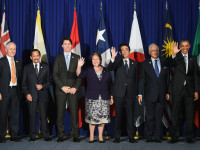Later today, the 12 countries that make up the Trans Pacific Partnership, a massive global trade deal that includes Canada, the United States, and Japan, will gather in New Zealand to formally sign the agreement (the official signing day is February 4th, but with time zone differences, the signing ceremony starts at 5:30 pm ET on the 3rd). Signing the TPP is a major step forward for the controversial treaty, but questions still abound over whether it will be ratified and take effect. The Trouble with the TPP series, which I initially planned to wrap up today having examined issues ranging from copyright term extension to the weak cultural exception, takes a one-day break from substantive concerns to focus on the future. However, given that there are still some important issues to be considered, the series will continue well into this month.
While the Liberal government has been cautious about expressing its support – International Trade Minister Chrystia Freeland has been consistent in calling for consultation not conclusions – the decision to sign the TPP was never much in doubt. The agreement contains incentives to be an “original signatory”, since only those countries qualify for the rules related to entry into force of the agreement. To stay on the sidelines at this early stage might have kept Canada out of the TPP for good.







